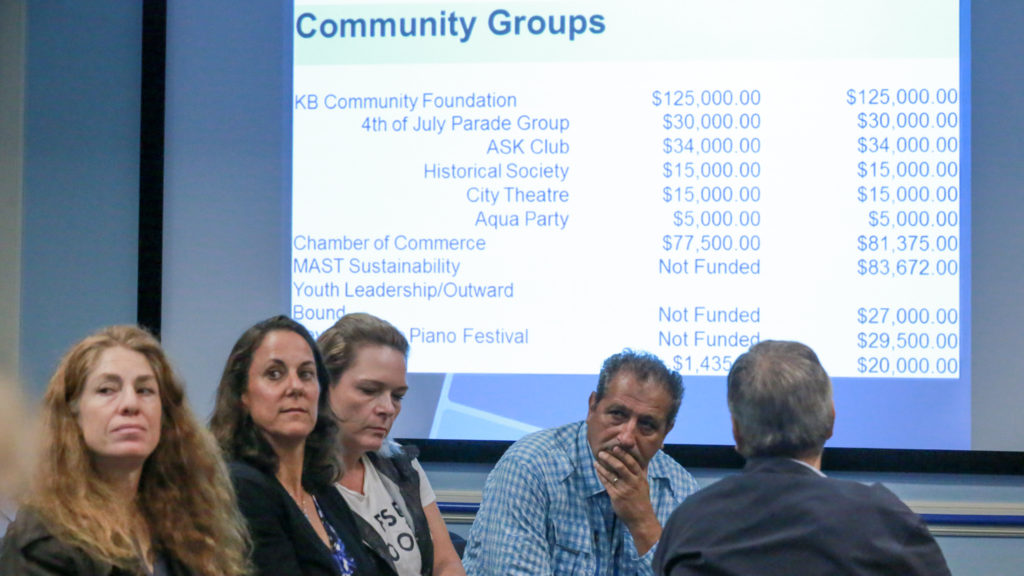Mayor: Now Not the Time for Tax Cuts
Tony WintonAugust 5, 2019

Residents look at budget numbers for community groups during Manager Andrea Agha’s budget presentation, June 18, 2019. An initial budget that assumed a tax decrease did not provide funding for community groups, but Mayor Mike Davey says he expects tax income to remain flat for the 2020 budget. (Key News/Tony Winton)
Key Biscayne Mayor Mike Davey expects taxes will remain flat next year, with the only major capital spending being beach renourishment and preliminary survey work for utility undergrounding.
But he says residents should be prepared for critical — and expensive — spending in 2020.
His plan: ask voters to approve major borrowing on the November 2020 ballot for the resiliency challenges of sea level rise, Bear Cut Bridge, undergrounding and other critical issues. The price tag and the details will be his main focus in the coming months. Budget hearings will continue in September.
“We have a lot of projects we want to start. No. 1 is stormwater drainage. We need to get going,” he said.
The Village Council meets Aug. 27 for another workshop where Village Manager Andrea Agha is expected to present a more formal Fiscal Year 2020 budget. An initial draft in June spelled out the possibility of deep cuts to popular programs and little spending on major capital projects.
Agha said that document was based, in part, on a strategic planning workshop in May where Council members all said their priority was efficient government.
This past week, Davey suggested Agha may have misheard what a majority of Council members actually want, leading her to make erroneous conclusions about budget priorities.
“I guess I wasn’t playing four-dimensional chess like some people were playing. Efficiency means using money for the best purposes.”
In a tumultuous June 18 meeting, the Council split 4-3 on a nonbinding procedural vote that would leave property taxes unchanged. Some Council members had argued for a tax cut, saying the Village needed to take in less revenue because of a 2.6% decline in property values.
When property values go up or down, municipalities adjust tax rates to determine the actual number of dollars to be raised from each property. When property values rise, for example, keeping the tax rate the same would increase taxes. Key Biscayne’s tax appears as a line item on the Miami-Dade County property tax bill and is dwarfed by taxes for the County and Miami-Dade Public School District.
While saying he expects the Village taxes to remain the same, Davey agrees the Village should examine expenses carefully.
“[Council Member Luis] Lauredo is right about how we use consultants. Let’s have a specific task for them,” he said.
Lauredo has been especially critical of consultants for the undergrounding project and a financial analyst who developed an “assessment” method of financing the project. A Palm Beach County judge is expected to rule soon on a legal challenge to undergrounding assessments for that town’s utility undergrounding.
Davey also said the debate over taxes – known as the millage rate – was being overblown.
He said for the median residential owner, the difference between Agha’s tax cut budget and a tax-neutral spending plan would work out to about $3 a month.
“That’s a cup of coffee,” he said. “It’s not just reducing expenditures. It’s about using money wisely.”


